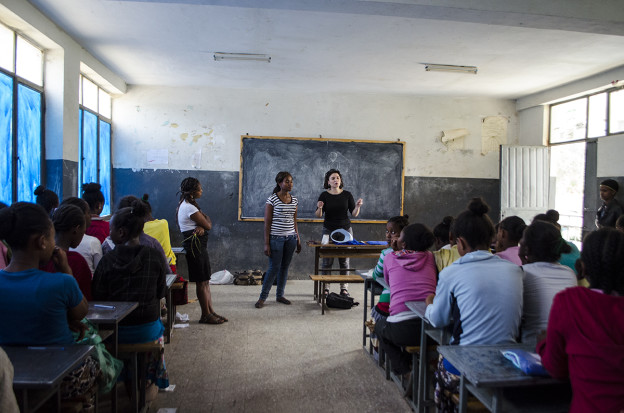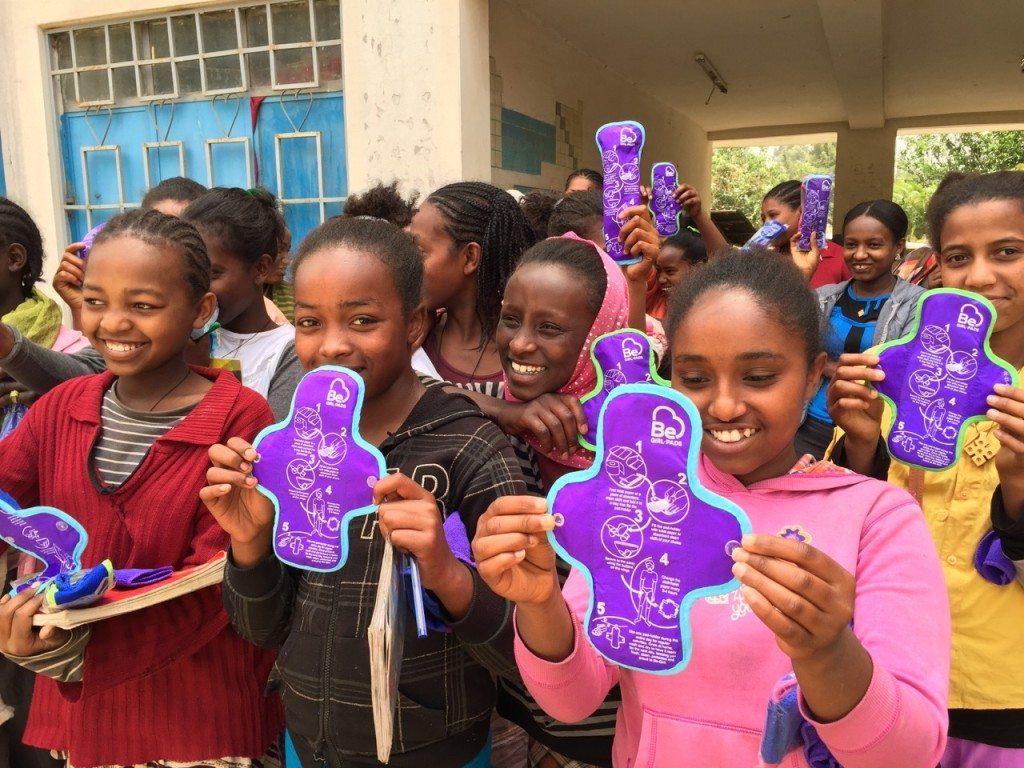This CEO Is Empowering Women Across The Globe Through Design
Requests: 0
Views: 57
To pursue an idea with full commitment, you must feel the urgency, and believe in your core that it's your responsibility to act on it.
Growing up in rural Colombia, I understand what it feels like to be denied opportunity. I built my career in industrial design as a consultant to create opportunity through design. I was fortunate to study Industrial Design in Colombia at Los Andes University, and then Sustainability Management at Columbia University in New York City. Over a ten-year period, as an independent design consultant, with my design studio, I designed products for Smart Design, Frog Design, Nike, Panasonic, Energizer, Tommy Hilfiger, Arnell Group, Curve ID, B.Robinson, and Playtex. I have worked in developing countries in East Africa and South America on better designs for cook stoves, agro-processing machines, soil testing devices and women empowerment programs through business and design.
 According to Girleffect.org, 250 million adolescent girls across the world live in poverty, lacking the access to safe and dignified menstrual management resources. Be Girl is a social enterprise focused on empowering women through designing the resources that they need. (Photo courtesy of Be Girl)
According to Girleffect.org, 250 million adolescent girls across the world live in poverty, lacking the access to safe and dignified menstrual management resources. Be Girl is a social enterprise focused on empowering women through designing the resources that they need. (Photo courtesy of Be Girl)
 Sierra: "A project that started with a prototype made out of an umbrella and a mosquito net is now a driver for a movement to change the conversation around menstruation." (Photo courtesy of Be Girl)
When I was in rural Uganda, I saw girls lack the most basic supplies to manage their menstruation with dignity truly. It made my heart sink. As a woman and as a designer, I felt that I had to use my skills do something to help in any way possible. Therefore, in 2014, I established Be Girl to do just that: empower women through design. A project that started with a prototype made out of an umbrella and a mosquito net is now a driver for a movement to change the conversation around menstruation.
Sierra: "A project that started with a prototype made out of an umbrella and a mosquito net is now a driver for a movement to change the conversation around menstruation." (Photo courtesy of Be Girl)
When I was in rural Uganda, I saw girls lack the most basic supplies to manage their menstruation with dignity truly. It made my heart sink. As a woman and as a designer, I felt that I had to use my skills do something to help in any way possible. Therefore, in 2014, I established Be Girl to do just that: empower women through design. A project that started with a prototype made out of an umbrella and a mosquito net is now a driver for a movement to change the conversation around menstruation.
 Girls in Ethiopia pose with their Be Girl products. Sierra: "If something as basic as a menstrual pad is the stepping-stone that makes it possible for a girl to escape the poverty trap, than it is worth putting stepping-stones in every possible path."(Photo courtesy of Be Girl)
Girls in Ethiopia pose with their Be Girl products. Sierra: "If something as basic as a menstrual pad is the stepping-stone that makes it possible for a girl to escape the poverty trap, than it is worth putting stepping-stones in every possible path."(Photo courtesy of Be Girl)
But then, one encounter changed the course of my life.
 According to Girleffect.org, 250 million adolescent girls across the world live in poverty, lacking the access to safe and dignified menstrual management resources. Be Girl is a social enterprise focused on empowering women through designing the resources that they need. (Photo courtesy of Be Girl)
According to Girleffect.org, 250 million adolescent girls across the world live in poverty, lacking the access to safe and dignified menstrual management resources. Be Girl is a social enterprise focused on empowering women through designing the resources that they need. (Photo courtesy of Be Girl)
 Sierra: "A project that started with a prototype made out of an umbrella and a mosquito net is now a driver for a movement to change the conversation around menstruation." (Photo courtesy of Be Girl)
When I was in rural Uganda, I saw girls lack the most basic supplies to manage their menstruation with dignity truly. It made my heart sink. As a woman and as a designer, I felt that I had to use my skills do something to help in any way possible. Therefore, in 2014, I established Be Girl to do just that: empower women through design. A project that started with a prototype made out of an umbrella and a mosquito net is now a driver for a movement to change the conversation around menstruation.
Sierra: "A project that started with a prototype made out of an umbrella and a mosquito net is now a driver for a movement to change the conversation around menstruation." (Photo courtesy of Be Girl)
When I was in rural Uganda, I saw girls lack the most basic supplies to manage their menstruation with dignity truly. It made my heart sink. As a woman and as a designer, I felt that I had to use my skills do something to help in any way possible. Therefore, in 2014, I established Be Girl to do just that: empower women through design. A project that started with a prototype made out of an umbrella and a mosquito net is now a driver for a movement to change the conversation around menstruation.
WATCH: INSIDE LOOK AT BE GIRL WITH ITS CEO DIANA SIERRA
The lack of mobility resulting from social taboos and inadequate resources is physical imprisonment and makes this such a pressing issue. The fact that a bloodstain is standing between millions of girls and their chance to obtain an education and break out of generational poverty traps is a silent crisis. I think it is one worthy of giving it my all, because every girl deserves the chance to tap into the great potential that is in every human being. I have always believed in social enterprise, and empowering people through design. Working with girls at such an intimate level while designing the product, and listening to them tell me how much they wanted the pads to be colorful, girly and beautiful reminded me that no matter what your income level is, you still want and aspire to good things, beautiful things. My job as designer is to serve this population with the same attention to aesthetics and function as I do with any other user segment. People love beautiful objects - well-designed products that speak to their needs, reflect their aspirations and dreams. Good design should be inclusive, responsive, and accessible to everyone. And this is how I think I can make a difference by empowering women through design.But the challenges come in many shapes...
Financial, emotional, physical and more. Trying to make a social venture, like Be Girl, a success can test you in every single one. But, the one I think is the hardest to deal with – especially when things don't go as planned – is the burning question...“Is all this work, the sweat and the tears really worth it - will it make a difference?" That is a haunting question that will be always around, which is why it really matters that you believe in your core that even small drops can make waves. When something as simple as a pad makes a young woman feel proud to be girl, we are not talking about the pad at all. We are talking about the feeling of empowerment and self-efficacy that comes with that object. I believe though we may be a tiny drop in an ocean, we still can make waves. Changing lives is a bold aspiration, but that is what we shoot for every day. Girls in Ethiopia pose with their Be Girl products. Sierra: "If something as basic as a menstrual pad is the stepping-stone that makes it possible for a girl to escape the poverty trap, than it is worth putting stepping-stones in every possible path."(Photo courtesy of Be Girl)
Girls in Ethiopia pose with their Be Girl products. Sierra: "If something as basic as a menstrual pad is the stepping-stone that makes it possible for a girl to escape the poverty trap, than it is worth putting stepping-stones in every possible path."(Photo courtesy of Be Girl)
QUICK QUESTIONS RIZZARR HAD FOR DIANA SIERRA
1. What have been your major accomplishments thus far?
We have conducted product and commercial pilots in Rwanda, Malawi, Uganda, Tanzania, Mali, Jordania, Morocco, Kenya, Rwanda, and Ethiopia, thus far, deploying a total of 4,095 product units to nearly 3,000 girls. Additionally, Be Girl now has partnerships with PLAN Ethiopia, Save the Children Mali, Project SOAR Morocco, and Ecozoom in Kenya that will deploy multiple pilots this year. Next up for Be Girl is to create a global brand that stands for a positive conversation about menstruation and what it is to be a woman. That starts with products that are beautiful, high performance and bold. We believe that a solution that was born in Africa can also be a solution for the world.2. How can people support you?
FIRST (and most importantly): Awareness. Raise awareness to the fact that while menstruation is the gift of life, it can be a burden for millions of girls and women who live in poverty. Everyone should have access to the resources to manage menstruation safely and with dignity. This is a silent crisis muffled by shame and taboos - it is only by shining a light on it and talking about this issue that we can truly make a difference. TWO: If you are interested in giving an individual girl the tools to manage her menstruation with pride and dignity, then please consider sponsoring a girl with Be Girl products through our sponsorship page. THREE: Finally, if you have more capacity and want to get hands on, you can be involved with Be Girl or any other organization that works in this social space. You can find us online at www.BeGirl.org or on Facebook. There are never enough hands for all that needs to be done and you will be amazed how your work can touch so many lives. As I remind myself, I hope you will remember that even small drops can make waves and you never know where the waves will take you.Reactions